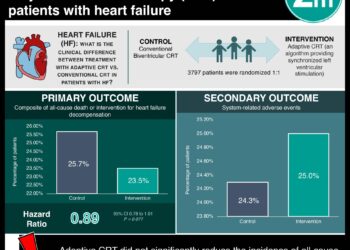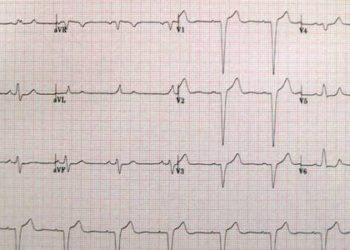QRS morphology and duration associated with cardiac resynchronization outcomes
Image: PD
1. Heart failure patients with left bundle branch block (LBBB) and QRS durations of 150 ms or greater had better outcomes after cardiac resynchronization defibrillator placement. Patients with both LBBB and QRS > 150ms had 3-year mortality of 20.9%, while patients with neither had 3-year mortality of 32.3%.
2. Heart failure patients receiving cardiac resynchronization defibrillators without LBBB and with a QRS duration of 120-149 ms were found to have the highest rate of adverse outcomes.
Evidence Rating Level: 2 (Good)
Study Rundown: Previous studies have shown cardiac resynchronization therapy (CRT) to be an effective therapy for heart failure patients. However, not all patients receiving this therapy have beneficial outcomes. This study sought to characterize patients who would be good candidates for CRT based upon QRS morphology and duration. Ultimately, the authors showed that heart failure patients with left bundle branch block (LBBB) and QRS durations of 150 ms or greater were most likely to have good outcomes with cardiac resynchronization defibrillator placement (i.e. lower readmission rates and mortality). They also found that patients with QRS durations between 120-149 ms were most likely to have adverse outcomes. Given the known association of LBBB and widened QRS intervals with heart failure mortality, likely in part due to cardiac dyssynchrony, the results appear support this biological relationship. A major strength of this study, in addition to its large sample size, is that it is the first to include both patients who were admitted for CRT and those who were admitted for other reasons. An inherent limitation of the study, given its retrospective, cohort design, is that there was no control group. While the study provides evidence supporting the use of QRS morphology and QRS interval duration when considering CRT in heart failure patients, future research should validate and replicate the findings of this study.
Click to read the study, published today in JAMA
Relevant Reading: Cardiac resynchronization therapy for patients with left ventricular systolic dysfunction: a systematic review
In-Depth [retrospective cohort study]: This study included 24,169 patients from the National Cardiovascular Data Registry’s Implantable Cardioverter-defibrillator Registry who were Medicare fee-for-service beneficiaries receiving cardiac resynchronization therapy-defibrillators. Data on patients was collected for 3 years and data on all-cause mortality, all-cause readmission, cardiovascular readmission, heart failure readmission, and complications were used. At one year, patients with LBBB and QRS duration of 150 ms or greater had better rates of all outcomes; the mortality rate was 5.6% and the readmission rate was 38.6%. The adjusted risk of 3 year mortality was also lowest in this population with LBBB and QRS duration of 150ms or greater at 20.9%. The second lowest 3 year mortality rate was in patients with LBBB and QRS durations between 120-149 ms (26.5%, HR 1.30 99% CI 1.18-1.42). Patients with no LBBB but QRS duration of 150ms or greater had 3-year mortality of 30.7. The highest 3 year mortality rate was among patients with no LBBB and QRS durations between 120-149 ms (32.3%, HR 1.52, 99%CI 1.38-1.67).
By Jeffrey Cohen and Rif Rahman
More from this author: Link of low vitamin D with coronary heart disease varies by race, Most physicians point to others to control healthcare costs
© 2013 2minutemedicine.com. All rights reserved. No works may be reproduced without expressed written consent from 2minutemedicine.com. Disclaimer: We present factual information directly from peer reviewed medical journals. No post should be construed as medical advice and is not intended as such by the authors, editors, staff or by 2minutemedicine.com. PLEASE SEE A HEALTHCARE PROVIDER IN YOUR AREA IF YOU SEEK MEDICAL ADVICE OF ANY SORT.


![Adverse pregnancy outcomes associated with thrombophilias [Classics Series]](https://www.2minutemedicine.com/wp-content/uploads/2015/07/Classics-2-Minute-Medicine-e1436017941513-350x250.png)

![Spironolactone not beneficial in heart failure with preserved ejection fraction [TOPCAT trial]](https://www.2minutemedicine.com/wp-content/uploads/2014/04/Pulmonaryedema09-350x250.jpg)




